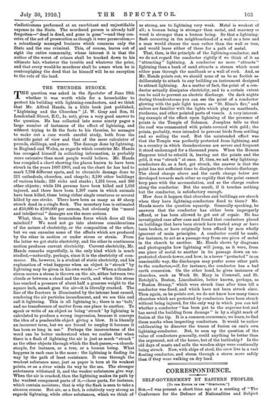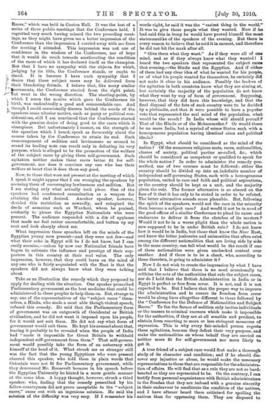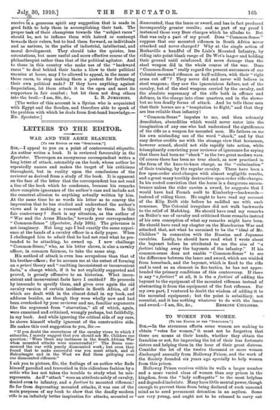CORRESPONDENCE.
SELF-GOVERNMENT BY EASTERN PEOPLES.
[To TER EDITOR or me a arsorsroa."] SIB,—I was present a short time ago at a meeting of "The Conference for the Defence of Nationalities and Subject Races," which was held in Caxton Hall. It-was the last of a series of three public meetings that the Conference held. I regretted very much having missed the two preceding meet- ings, as they might have given me a better impression of the Conference than the impression I carried away with me from the meeting I attended. This impression was not one of confidence in the wisdom of the Conference, nor of hope that it would do much towards ameliorating the condition of the races of which it has declared itself as the champion. Not that I have no sympathy with the objects for which, judging by its title, the Conference stands, or ought to stand. It is because I have such sympathy that I >1‘ desire that these subject races may be delivered from
e their blundering friends. I believe that, like many similar `Isiovements, the Conference started from the right point, .;a" tut went in the wrong direction. The starting-point, by which I mean the motive which gave the Conference its j birth, was undoubtedly a good and commendable one. And k though I could occasionally discern behind the words of the speakers some ulterior motive, such as party or political con- siderations, still I am convinced that the Conference started with the genuine desire of doing good to the races which it champions. But unfortunately I cannot, on the strength of the speeches which I heard, speak as favourably about the course taken by the Conference to attain its end. Such encouragement of sedition and lawlessness as seemed to sound its leading note can result only in defeating its very purpose, which is alleged to be the promotion of the welfare of the subject races by giving them self-government. Such agitation neither makes these races better fit for self- government, nor does it convince any one who has their welfare at heart that it does them any good.
Now, to those that were not present at the meeting of which I speak it might appear that I am wronging the speakers by accusing them of encouraging lawlessness and sedition. But I am stating only what actually took place. One of the speakers had condemned assassination as a weapon for attaining the end desired. Another speaker, however, derided this restriction as cowardly, and eulogised the deeds of assassins such as Wardani, whom he praised, evidently to please the Egyptian Nationalists who were present. The audience responded with a din of applause that made me feel rather uncomfortable, and button up my Coat and look sharply about me.
What impression these speeches left on the minds of the Egyptian young men present—and they were not few—and what their echo in Egypt will be I do not know, but I can easily surmise,—unless by now our Nationalist friends have begun to estimate the influence and prestige of their sup- porters in this country at their real value. The only impression, however, that they could leave on the mind of any one who is fairly acquainted with the East is that the speakers did not always know what they were talking about Take as an illustration the remedy which they proposed to apply for dealing with the situation. One speaker prescribed Parliamentary government as the best medicine that could be administered to these peoples to help them on. But, strange to say, one of the representatives of the " subject races " them- selves, a Hindu, who made a most able though violent speech, refused this remedy. He said that the Parliamentary form of government was an outgrowth of Occidental or British civilisation, and he did not want it imposed upon his people, for it would not suit them. He did not say what form of government would suit them. He kept his counsel about that, leaving it probably to be revealed when the people of India had " made it impossible for Great Britain to withhold independent self-government from them." That self-govern- ment would possibly take the form of an autocracy with himself at the head of it. What struck me as stranger still was the fact that the young Egyptians who were present cheered this speaker, who told them in plain words that Orientals were not fit for Parliamentary government, while they denounced Mr. Roosevelt because in his speech before the Egyptian University he hinted in a more gentle manner at the same idea. A happy thought, however, struck a third speaker, who, finding that the remedy prescribed by his fellow-countrymen did not prove acceptable to the " subject races," came out with an ingenious solution. He said the solution of the difficulty was very easy. If I remember his words right., he said it was the " easiest thing in the world." It was to give those people what they wanted. Now if he had said this in irony he would have proved himself the most statesmanlike of the speakers of the evening. But there is every reason to believe that he said it in earnest, and therefore he did not hit the mark after all.
" Give them what they want" As if they were all of one mind, and as if they always knew what they wanted ! I beard the two speakers that represented the subject races that evening,—the Hindu and the Egyptian. And if either of them had any clear idea of what he wanted for his people, or of what his people wanted for themselves, he certainly did not make it clear to his audience. Possibly the leaders of the agitation in both countries know what they are aiming at, but certainly the majority of the population do not know what they want by way of form of government. Supposing, however, that they did have this knowledge, and that the final disposal of the fate of each country were to be decided by a plebiscite, and that it were possible to have a popular vote that represented the real mind of the population, what would be the result P In India whose will should prevail P That of the Hindu or of the Mohammedan P Or would there be no more India, but a myriad of minor States each with a homogeneous population having identical aims and political ideals ?
In Egypt, what should be considered as the mind of the nation P Of the numerous religious sects, races, nationalities, classes of society, political parties so-called, &c., which should be considered as competent or qualified to speak for the whole nation P In order to administer the remedy pre- scribed, one of two courses must be followed : either the country should be divided up into an indefinite number of independent self-governing States, each with a homogeneous population, united in race and faith and political aspirations, or the country should be kept as a unit, and the majority given the rule. The former alternative is so absurd on the face of it that it has only to be stated in order to be refuted. The latter alternative sounds more plausible. But, following the spirit of the speakers, would not the race in the minority then become a subject race P And would it not be in need of the good offices of a similar Conference to plead its cause and endeavour to deliver it from the clutches of its masters P Would it not be in a worse plight than the whole nation is now supposed to be in under British rule P I do not know how it would be in India, but those that know the Near East., and know the bitter jealousies and animosities that often exist among the different nationalities that are living side by side in the same country, can tell what would be the result if one of these nationalities were given unchecked control over another. And if there is to be a check, who, according to these theorists, is going to administer it P
Now I do not wish to create the impression by what I have said that I believe that there is no need occasionally to criticise the acts of the authorities that rule the subject races, nor do I hold that the British Administration in India or in Egypt is perfect or free from error. It is not, and it is not expected to be. But I believe that the proper way to improve the administration and to ensure its freedom from error would be along lines altogether different to those followed by the "Conference for the Defence of Nationalities and Subject Races." To fan the flames of sedition only incites individuals or the masses to criminal excesses which make it impossible for the authorities, if they are at all sensible and prudent, to abstain from resorting to more or less stringent measures of repression. This is why every fair-minded person regrets these agitations, because they defeat their very pm-pose, and make the nationalities on whose behalf they are carried on neither more fit for self-government nor more likely to get it.
A true friend of a. subject race would first make a thorough study of its character and condition; and if he should dis- cover any injustice or abuse, he would make the necessary representations to those that are responsible for the administra- tion of affairs. He will find that as a rule they are not so hard- hearted as they are represented to be. On the contrary, I can testify from personal acquaintance with British administrators in the Soudan that they are imbued with a genuine sincerity in their endeavour to ameliorate the condition of the natives, and I have oftener heard them criticised for spoiling the natives than for oppressing them. They are disposed to receive in a generous spirit any suggestion that is made in good faith to help them in accomplishing their task. The proper task of their champions towards the "subject races" should be, not to inflame them with hatred or contempt towards their rulers, but to lead them forward, as individuals and as nations, in the paths of industrial, intellectual, and moral development. They should take the quieter, less ostentatious, but more useful and more effective course of the philanthropist rather than that of the political agitator. And to those in this country who make use of the " backward races " to deal behind their backs a blow to their political enemies at home, may I be allowed to appeal, in the name of these races, to stop making them a pretext for furthering their own political ends ? If they have anything against Imperialism, let them attack it in the open and meet its supporters in fair combat ; but let them not drag others into the broil.—I am, Sir, &c., L. B. JIIREIDINI.
[The writer of this account is a Syrian who is acquainted with Egypt and the Soudan, and therefore able to speak of the problem with which he deals from first-hand knowledge.— ED. Spectator.]








































 Previous page
Previous page